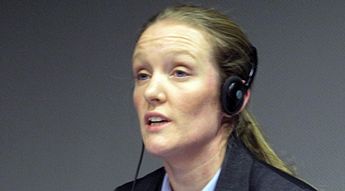|
Sheelagh Brady, a former employee of the Mission Analytical Capability at the European Union Police Mission in BiH. |
Sheelagh Brady, a former employee of the European Union Police Mission in Bosnia and Herzegovina’s (BiH) Mission Analytical Capability, in Sarajevo today presented results of an investigation in which which she came across numerous indications of the involvement of powerful Bosnian elites in drug and arms smuggling and human trafficking.
“A story goes that the drugs are not being confiscated because powerful elites are involved and connected with others outside of the country and they all hold positions which makes them and the drugs untouchables,” Brady wrote in “Organized Crime in BiH“.
This blurred picture provides an opportunity for manipulation, allowing alleged relationships between criminals and the powerful elite to go unidentified and un-investigated.
Brady said that the exact extent of organized crime is not fully known because of lack of intelligence data, limited data exchange, police agency structures and political obstruction.
Renzo Daviddi, deputy head of the European Union’s delegation in BiH. who was at the press conference, said that financing of police and intelligence agencies had to be improved as did the exchange and coordination of records among them.
“Since a lot of money was poured down into the police agencies, it is important to find out what it was spent on, whether it was well invested and do a financial analysis,” said Daviddi.
Brady also raised issues about non-traditional organized crimes, such as privatization, procurement and tender fraud. She said many police agencies noted that they did not have the capacity to investigate these offenses.
The author said corruption was one of the worrying issues in BiH because of the few prosecuted cases and the fact that those few convicted persons have spent little or no time in prison.
Brady cited data published by the Center for Investigative Reporting in Sarajevo showing that one out of five persons found guilty of corruption gets a prison sentence, while 80 percent of the convicted have been either paroled or fined.
Published October 31, 2012









